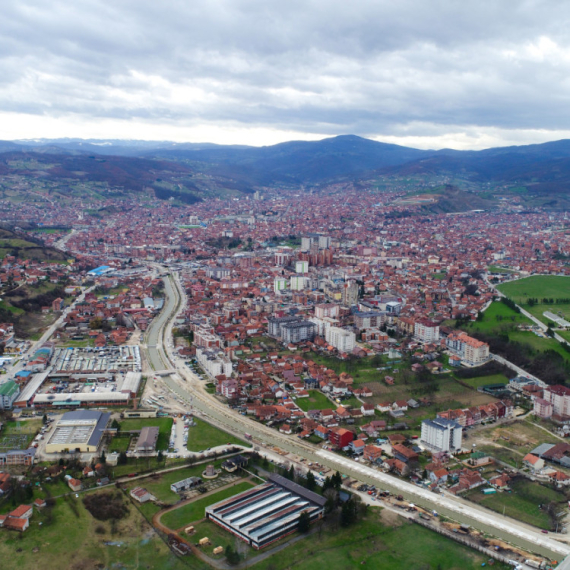Solution for asylum seekers "together with EU"
An EU mechanism temporarily introducing visas for countries that are home to large numbers of false asylum seekers is to enter into force this week.
Tuesday, 07.01.2014.
10:54

BELGRADE, BRUSSELS An EU mechanism temporarily introducing visas for countries that are home to large numbers of false asylum seekers is to enter into force this week. Serbia is among those countries, and commenting on the situation, Minister of EU Integration Branko Ruzic said on Monday that he was confident that Serbia, in cooperation with the EU - in particular, with Germany - "will find a joint solution." Solution for asylum seekers "together with EU" This solution should solve the problem of false asylum seekers "and avert the danger of the visa-free regime being suspended." Official data show that the number of false asylum seekers leaving Serbia for EU countries has declined considerably over the past few years, with the exception of Germany, which provides significant benefits to asylum seekers, Ruzic said. In a statement to Tanjug, Ruzic recalled that Serbia and the EU are working together on many projects aimed at keeping Serbia's marginalised population from seeking asylum in EU countries for financial reasons, including the Roma population living in Belgrade and in the northern province of Vojvodina. Ruzic said that the measures undertaken by Serbia are good, but that the key problem lies in organised groups seeking asylum out of financial interest. Tanja Fajon, the former European Parliament (EP) rapporteur on visa liberalization, warned that Serbia is facing a real danger of temporary reinstatement of visas due to an increase in the number of false asylum seekers, and called on the Serbian authorities to do everything they can. She also said that EU countries should revise their asylum policies, welcoming Germany's recent decision to place Serbia and other Western Balkan countries, for which a visa-free regime is now in place, on its list of safe countries. This will significantly cut short the procedure for obtaining asylum, and probably also lower the number of asylum requests, Fajon said. Jelko Kacin, the EP rapporteur for Serbia, believes that the country is in no immediate danger of the Schengen visas being reintroduced. Once a request to reintroduce visas is submitted to it by an EU member country, the European Commission must first verify the situation on the ground, and ascertain that there is no other way to reduce the number of asylum seekers, Kacin said. Kacin said that the Serbian Ministry of Interior, headed by Ivica Dacic, is among those who deserve the most credit for the fact that Serbia met the conditions for the Schengen White List in 2009. Kacin said that he is confident that Dacic, who is also Serbia's prime minister, is doing everything he can to halt or at least significantly curb the influx of false asylum seekers. Kacin added that Germany has announced recently that it will list Serbia as a safe country of origin, which will result in drastically shorter processing of applications submitted by Serbian citizens seeking asylum in Germany. In this way, attempts at obtaining asylum for the purpose of using financial aid would also become senseless, he said. The EU interior and justice ministers adopted in December a so-called protective mechanism allowing for a six-month suspension of the visa-free regime from January 9. In 2009, EU member countries received around 11,500 asylum requests from the Western Balkans, but the number of requests filed in 2013 is more than four times higher. Tanjug
Solution for asylum seekers "together with EU"
This solution should solve the problem of false asylum seekers "and avert the danger of the visa-free regime being suspended."Official data show that the number of false asylum seekers leaving Serbia for EU countries has declined considerably over the past few years, with the exception of Germany, which provides significant benefits to asylum seekers, Ružić said.
In a statement to Tanjug, Ružić recalled that Serbia and the EU are working together on many projects aimed at keeping Serbia's marginalised population from seeking asylum in EU countries for financial reasons, including the Roma population living in Belgrade and in the northern province of Vojvodina.
Ružić said that the measures undertaken by Serbia are good, but that the key problem lies in organised groups seeking asylum out of financial interest.
Tanja Fajon, the former European Parliament (EP) rapporteur on visa liberalization, warned that Serbia is facing a real danger of temporary reinstatement of visas due to an increase in the number of false asylum seekers, and called on the Serbian authorities to do everything they can.
She also said that EU countries should revise their asylum policies, welcoming Germany's recent decision to place Serbia and other Western Balkan countries, for which a visa-free regime is now in place, on its list of safe countries.
This will significantly cut short the procedure for obtaining asylum, and probably also lower the number of asylum requests, Fajon said.
Jelko Kacin, the EP rapporteur for Serbia, believes that the country is in no immediate danger of the Schengen visas being reintroduced.
Once a request to reintroduce visas is submitted to it by an EU member country, the European Commission must first verify the situation on the ground, and ascertain that there is no other way to reduce the number of asylum seekers, Kacin said.
Kacin said that the Serbian Ministry of Interior, headed by Ivica Dačić, is among those who deserve the most credit for the fact that Serbia met the conditions for the Schengen White List in 2009.
Kacin said that he is confident that Dačić, who is also Serbia's prime minister, is doing everything he can to halt or at least significantly curb the influx of false asylum seekers.
Kacin added that Germany has announced recently that it will list Serbia as a safe country of origin, which will result in drastically shorter processing of applications submitted by Serbian citizens seeking asylum in Germany.
In this way, attempts at obtaining asylum for the purpose of using financial aid would also become senseless, he said.
The EU interior and justice ministers adopted in December a so-called protective mechanism allowing for a six-month suspension of the visa-free regime from January 9.
In 2009, EU member countries received around 11,500 asylum requests from the Western Balkans, but the number of requests filed in 2013 is more than four times higher.







































Komentari 1
Pogledaj komentare